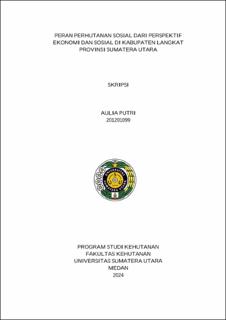| dc.contributor.advisor | Affandi, Oding | |
| dc.contributor.advisor | Arinah, Hafizah | |
| dc.contributor.author | Putri, Aulia | |
| dc.date.accessioned | 2024-12-06T08:32:33Z | |
| dc.date.available | 2024-12-06T08:32:33Z | |
| dc.date.issued | 2024 | |
| dc.identifier.uri | https://repositori.usu.ac.id/handle/123456789/99215 | |
| dc.description.abstract | Social forestry aims to reduce poverty and conflicts related to land rights/access through the provision of area management decrees in the form of Community Forests, Forestry Partnerships, Customary Forests, Village Forests and Community Plantation Forests. The study aims to analyze the increase in income and the emergence of alternative employment from social forestry activities, analyze the financial viability of forest farmer group businesses and to analyze the influence of social forestry activities on community knowledge, behavior change, comfort and constraints in managing the area. Data collection was conducted by observation, interviews, questionnaires, documentation and library studies. Data analysis was conducted by descriptive analysis and financial analysis with net present value, benefit cost ratio and internal rate of return formulas for economic perspective and descriptive analysis for social perspective. The results showed that of the 3 social forestry schemes examined, only the Forestry Partnership scheme provided additional income and opened alternative employment opportunities for management members through the establishment of KUPS. Of the 3 social forestry, the financial analysis of the Forestry Partnership scheme has a greater value of feasibility criteria with NPV value of Rp. 602.388.386/5 years, B/C ratio of 2.14 and IRR of 60% and is said to be feasible to continue. Of the 3 social forestry, only the Forestry Partnership scheme was able to provide members with knowledge about the Forestry Partnership and its objectives. Behavioral changes also occur, namely the community no longer cutting mangrove trees and the emergence of mutual cooperation behavior. The community also feels comfortable in managing the area due to the emergence of KUPS that provides income for members, and there are no obstacles that interfere with the sustainability of the Forestry Partnership scheme. | en_US |
| dc.language.iso | id | en_US |
| dc.publisher | Universitas Sumatera Utara | en_US |
| dc.subject | Economic and social perspectives | en_US |
| dc.subject | Forest Farmer Group (KTH) | en_US |
| dc.subject | Social Forestry | en_US |
| dc.subject | Social Forestry Business Group (KUPS) | en_US |
| dc.title | Peran Perhutanan Sosial dari Perspektif Ekonomi dan Sosial di Kabupaten Langkat Provinsi Sumatera Utara | en_US |
| dc.title.alternative | The Role of Social Forestry from Economic and Social Perspectives in Langkat Regency, North Sumatra Province | en_US |
| dc.type | Thesis | en_US |
| dc.identifier.nim | NIM201201099 | |
| dc.identifier.nidn | NIDN0003067301 | |
| dc.identifier.nidn | NIDN0023049403 | |
| dc.identifier.kodeprodi | KODEPRODI54251#Kehutanan | |
| dc.description.pages | 95 Pages | en_US |
| dc.description.type | Skripsi Sarjana | en_US |
| dc.subject.sdgs | SDGs 16. Peace, Justice And Strong Institutions | en_US |


